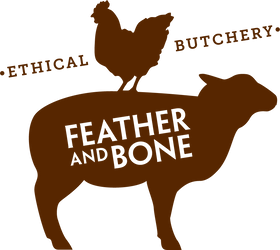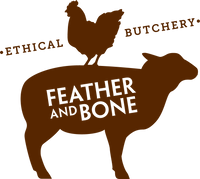Drought, fire and an impossible bind
This might be the hardest newsletter we've had to write since we started writing them in 2009.
We were hoping to romp joyfully in to 2020 with optimism and verve, sashaying through the newsletter, waxing lyrical about gorgeous produce, boasting about the drought-defying quality and skill of our regenerative farmers and taking the opportunity to gloat about our new-found independence now that Feral One has flown the nest and Feral Three is to be dispatched, in a cloud of Lynx and protein powder, to live at the Monastery. But this is no time for romping and verving and showing off.
That doesn't mean there isn't room for optimism, however, because God knows we all need some of that right now. But it does mean that sashaying is off the programme. Instead, we find ourselves caught in an impossible bind.
On one hand, the devastation of drought and fires makes us even more committed to the work of supporting regenerative farmers whose land management is actively combatting climate change and improving species diversity, water retention and carbon capture in the landscape. It's a profoundly different approach from the conventional, extractive agricultural model that is more like mining than traditional farming and with a similar long-term impact, leaving our ancient landscape weakened and vulnerable.
By contrast, regenerative farming prioritises balance over yield and values nature's superior ability to self-organise in pursuit of fertility. The farmer's job is to find a way to meet their needs without compromising the dynamic interaction between every creature in the ecosystem. In fact, whatever it is that the farmer is growing - plants or animals - the process must contribute to the overall health and diversity rather than compromise or deplete the system. This is something that we can surely all agree is of utmost importance, now more than ever.
(Unfortunately, despite the mounting costs of conventional, intensive agriculture, these farmers remain a minority. This is due to culture and consumer expectation. Also, old habits die hard. For the last 240 years, settler Australians have mostly farmed against than in concert with the land and it takes a crisis, a visionary and/or a very brave soul to buck generations of accepted practice.)
But no matter how clever you are, no one can farm without water. After four years of crippling drought across most of NSW, even the most skilled regenerative farmers are struggling to turn off enough produce to survive and many have stopped production altogether. They are a remarkably tough lot, but the pressure is taking its toll.
And then there's this savage fire season which Bruce Pascoe and Bill Gammage and others who tell the story of First Australian land management could have told us was coming and which veteran fire fighters have been warning us about. While most of the farms we work with have been threatened, at the time of writing, only one producer has been directly affected - Malfroys Gold with hives located in the Blue Mountains wilderness. Tim Malfroy's instagram account documents the damage as he checks on his hives and serves as an moving testament to the commitment and passion of regenerative farmers and the remarkable regenerative capacity of the land. In a similar vein, Milkwood Permaculture's Nick Ritar's heart-breaking 'Birds of Eastern Australia, 2020' instagram post catalogues dead birds in the ash at Mallacoota.
Some of us are brave and a handful are visionary, but all of us recognise a crisis when we see it. Our deepest hope is that this terrible, tragic fire season will be the crisis that forces all of us to become brave visionaries and gives us the courage to change our behaviour.
Which brings us back to today's uncomfortable problem.
The most effective way for you and us to support regenerative farmers is to seek out and buy their produce and it's our job to encourage you to do just that. Ideally, from us, so we can continue spruiking their wares and building the market for their beneficial produce.
However, given everything that's going on, spruiking anything right now seems grossly inappropriate. It's hard enough to find words to express our distress - each syllable seems feeble and wanting in the face of this crisis - let alone start do something crass like urge you all to go shopping.
But we all need to eat and eating can be a profoundly political act and a powerful tool in our arsenal in this battle to curb climate change and save the planet. Choose to source your food from ethical, sustainable sources. Hold retailers and producers to account, scrutinise and question and demand answers and transparency and send a message from the check out all the way back to the farm and back again.
Whatever and however you choose to eat - vegan, vegetarian or omnivore - make a commitment to spend your money on food that is produced with our future in mind. Because, make no mistake, no matter where we live or how much we're encouraged to identify as either city or bush folk, we are all custodians of this land.
It's hard not to be feel overwhelmed by distress and impotency, but the extraordinary feats of courage and compassion that we hear about from the fire fronts every day show us that there is real cause for optimism here. They show us what we're capable of.
Because if we decide that we care enough, we can choose optimism over fear and action over complacency. We can change the course of history and halt this terrible tide.
While it's hard to compete with the $45 million raised by the amazing Celeste Barber, every dollar helps and the scale of the fund-raising effort and the volunteering response at every level of the community gives us more cause for optimism. We've donated to the NSW Rural Fire Service and WIRES but there are many other organisations who need our support. Local artist Adrienne Doig is one of many who are giving the proceeds of artwork sales to WIRES. If you're in Sydney on Friday 31 January, Yerrabingin are holding a fundraiser auction to raise money for fire-affected Aboriginal families.
Stay safe, stay optimistic and please continue to seek out and support food grown by regenerative farmers. When this fire season has passed and on into the next one, they will still be there, working on behalf of all of us to restore and foster the fertility and resilience of our land.
If you're so inclined, buy from us.
~
Due to the combination of drought and fires, Sift Produce is not running her fortnightly Feather and Bone market for the moment. But you can support Sift farmers by purchasing a weekly vegetable box that you can pick up from us on Fridays or Saturdays.




Leave a comment